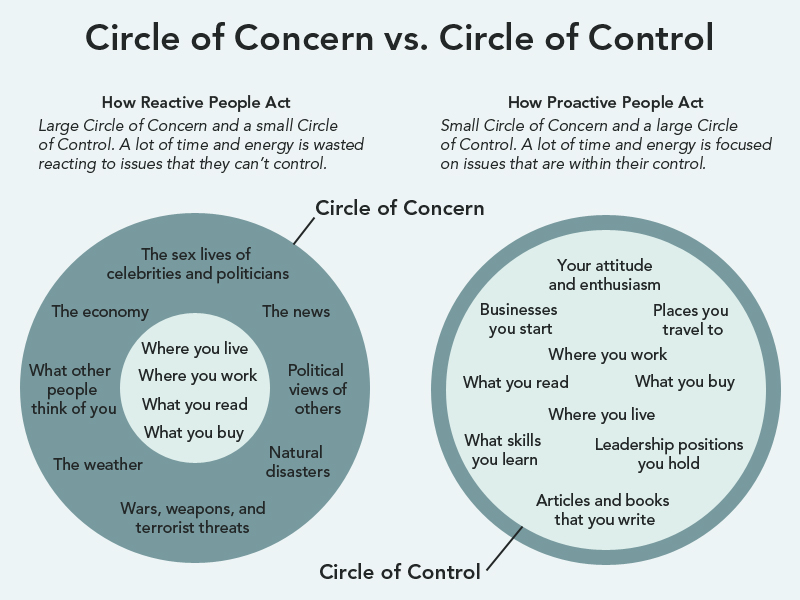Find what you can influence, and focus your attention
One of my favourite blog posts of 2013 was by James Clear. In it, he shared this diagram:
This brings into sharp focus an easy way in which we can quickly and easily change our lives for the better. All it takes is shifting our attention from things we can’t influence to those that we can. In other words, focusing on and increasing our Circle of Control.
Here’s some examples where I’ve tried to do just that:
Example 1
“Success or failure is caused more by mental attitude than by mental capacity.” (Sir Walter Scott)
During the years I was writing my doctoral thesis I had very little time to study. Not only did I have a demanding full-time teaching job, but my wife and I had a baby boy to take care of and worry about as only new parents can.
In order to find time to write I had to carve out time wherever I could. This would often mean getting up very early (~4am) to get in a couple of hours of study before the rest of the family woke up.
Feedback from my family and colleagues quickly confirmed what I suspected: on the days I got up early I was more positive and pleasant to be around. Instead of waking up and reacting to what happened around me, I could prepare for it. I was in control.
Example 2
“Most people would rather be certain they’re miserable, than risk being happy.” (Robert Anthony)
When I used to commute to work, like millions of people around the world I switched on the radio each morning. After all, everyone wants to keep up with the news. So I joined an audience regaled daily with, effectively, stories of misery and death.
The turning point came when I realised that I could listen to podcasts in the car. I can’t remember exactly what I used to listen to back then but these days my favourites include Thinking Allowed, 99% Invisible, and Freakonomics Radio. Not only do podcasts tend to be more upbeat than the news, but it’s like having my own radio station. I’m in control.
Example 3
“A book must be an ice-axe to break the seas frozen inside our soul.” (Franz Kafka)
In my early twenties I used to read the bible every morning. While I’ve strayed away from the faith, the habit of reading something familiar and with a moral dimension has remained with me. In fact, the book I’ve chosen to read on repeat each morning was written by a 17th-century Jesuit priest named Baltasar Gracián.
The Pocket Oracle and Art of Prudence is a collection of 200 maxims about dealing with yourself and others. I read anywhere from a couple to ten maxims most days, and I try to do so before dealing with other people. It’s the perfect mix of pragmatism and moral imperative. Interestingly, sometimes it’s translated The Art of Worldly Wisdom.
The important point here is less the book I’ve chosen and more the habit of reading something that encourages you to be the best you can be. When there’s so much happening around me in the world that I can’t influence, it’s nice being reminded that there are many things I can control.
Conclusion
These are small changes that make a huge difference to my life. They involve shifting my attention from other people’s agendas to my own. This year I’m looking to further increasing my Circle of Control rather than my Circle of Concern.
You’ll notice that all of these examples derive from morning activities. For me, it’s a crucial time: get it right and you’re set up for the day.
What do YOU do to help increase your Circle of Control?




